Not so long ago, staircases have become the subject of the interior of houses and apartments. Considering the entire palette of various interior styles, we can safely say that a metal staircase plays an important role in shaping the overall picture.
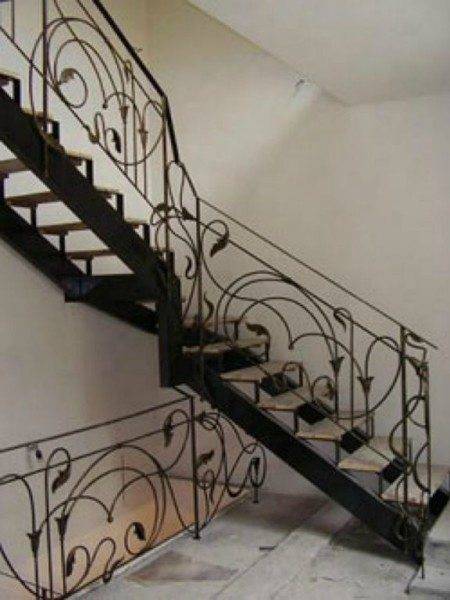
Currently, wood is inferior to metal in some respects. Metal, as a material for making stairs, wins:
- its carrying capacity;
- relative ease of use;
- long-term operation.
Therefore, the ladder and the metal have become practically inseparable. Another plus of iron and steel stairs is that the simplest structure without special skills can be made independently, having mastered the welding business.
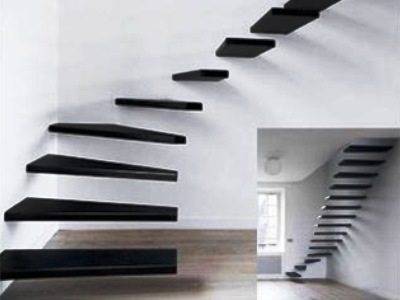
What are metal stairs?
In terms of their design, metal stairs, both external and internal, are no different from their brothers made of concrete and wood. Following the basic rules and regulations, projects are prepared for them.
Depending on the requirements and placement of the stairs, the most suitable shape is chosen. According to the manufacturing methods, two types of stairs can be noted:
- Welded;
- Forged.
Mastering forging is certainly not an easy and long-term occupation, but welding skills can be acquired in a couple of hands-on sessions.
The simplest types, projects of which you can create with your own hands, without special skills, include the following:
Ladders based on metal kosour - metal "ridges" to which the steps are attached
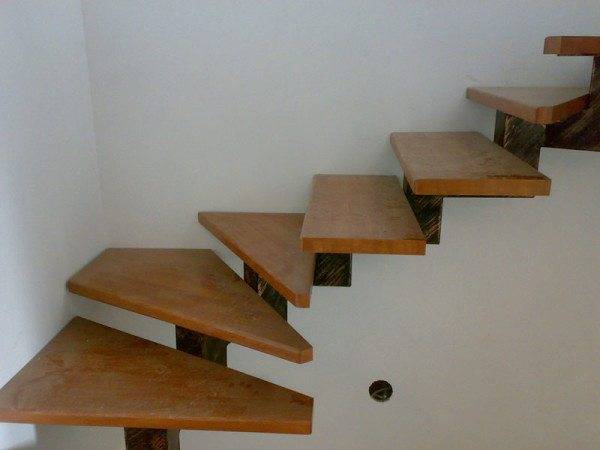
Kosoura, in turn, are divided into 4 types:
- Double kosour "zig-zag";
- Central kosour "zig-zag";
- Kosour special type;
- Double stringer of special type;
Marches on metal bolts - a structure in which individual steps are attached to the load-bearing wall with special bolts
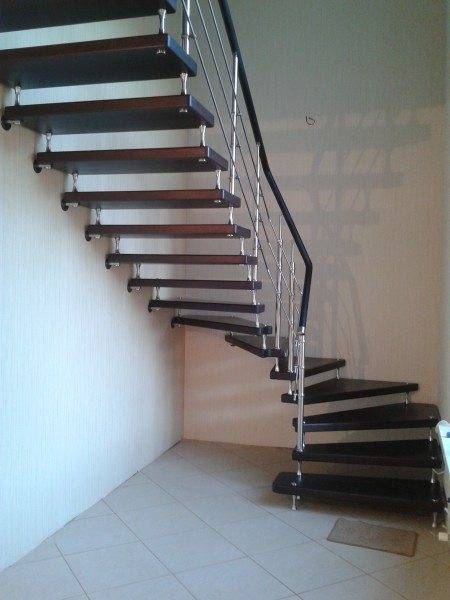
Spiral staircases
Note! It is better to entrust the manufacture of a spiral metal staircase to professionals, or you can assemble it from ready-made modules, otherwise the outcome may be disastrous. But remember - the price corresponds to the entertainment.
A structure consisting of supporting beams - bowstrings, between which treads are fixed
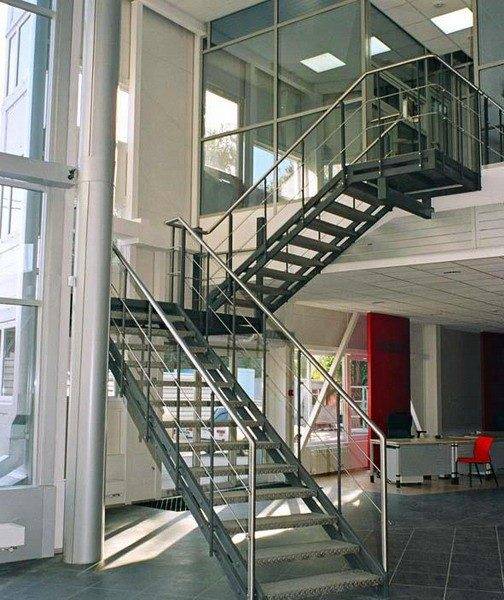
Features of the construction of the stairs with his own hand
If you think that you have all the skills for making a metal staircase with your own hands - it's time to decide what you need.
To begin with, according to the compiled project, which must be created in advance, you need to decide on the amount of material.
From the tool:
- welding machine;
Note! Please note that it is advisable to start welding on your own after a few practical sessions.
- emery wheel for deburring;
- mechanical saw;
- clamps;
- drills for metal.
If the project involves wooden treads or fences, then also a circular saw.
Actually, about the manufacture
What are remarkable about staircases made of metal is the rather simple manufacture of a frame. For such a staircase, we need corners and a channel.
A frame is constructed and welded from channels, to the side edges of which corners are welded.
In this case, the steps to the corners can be attached in two ways:
- a pair of corner pieces are cooked to the corners attached to the channel so that they form a kind of frame in which the edge of the step will be located;
- simple laying on the corner. In this case, the corner is completely under the step.
Note! If you replace the channel with a profile pipe, then when walking on stairs, vibration will not be felt, because the pipe has greater rigidity.
When manufacturing, if desired, you can weld metal steps for stairs. Sheet metal. After the work is completed, all seams and protrusions must be cleaned in order to remove all burrs and sagging.
Before giving a certain color to the stairs, it must be primed with a special liquid that prevents the formation of rust.
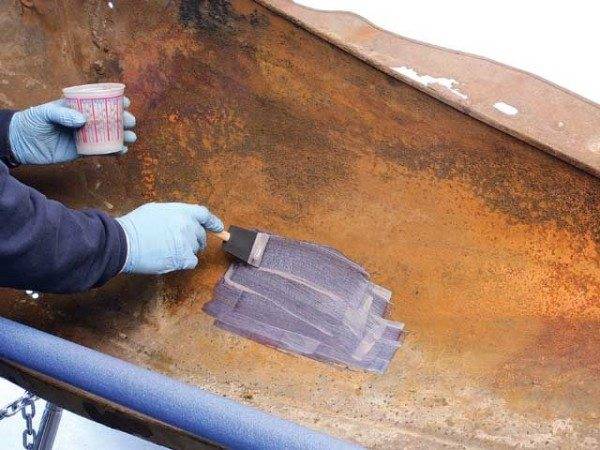
The instructions for making a spiral staircase are not as simple as in the case of a march staircase. In this example, we will consider the manufacture of a spiral staircase with a central pillar - this is a classic design that will be appropriate in any room. It is easy to manufacture and install, but no less beautiful.
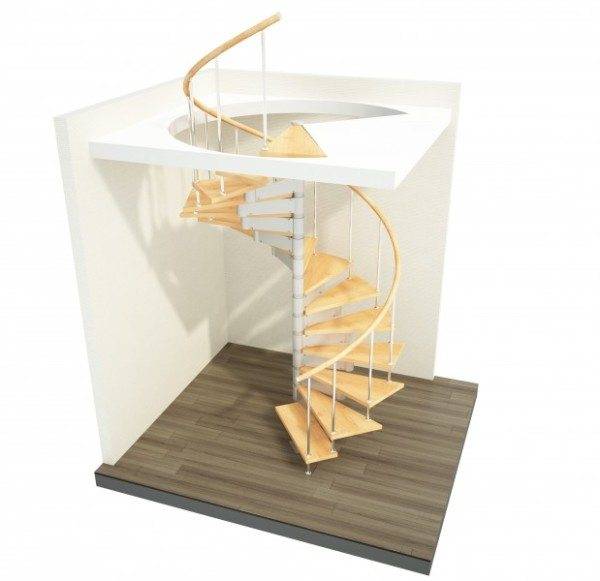
To make a spiral staircase, we need:
- a pipe with thick walls of the required length;
- a pipe of a larger diameter, for the manufacture of sleeves to which the steps will be attached;
- material from which the frame under the step will be made;
- the material of which the step itself will consist;
- primer;
- B-pillar base (thick-walled pipes).
Manufacturing of sleeves is nothing more than cutting a pipe into equal parts so that they are about 230-260 mm... It is necessary to cut off the sleeves strictly perpendicular to the pipe. Otherwise, it is very difficult to adjust the tread angle.
After the sleeves are threaded onto the B-pillar, there should be no gaps between them. The density should be as high as possible. If these elements are too large in diameter and gaps are formed between the pipe walls, you can make a seal ring from a pipe of a suitable diameter. This ring will be welded inside the sleeve.
For the manufacture of steps of the same shape, you can make a special jig. This is a kind of frame for keeping shape. metal structure and a size controller. It can be built from wood slats or from chipboard and pipe mandrel.
After all the components are ready, you can weld parts of the steps at the required angle using a jig. We weld the step to the sleeve, clean the seams from sagging and burrs.
The main part of the production has come to an end. It remains just to assemble the frame of the spiral staircase.
Everything is simple here:
- It is necessary to string the sleeves onto the B-pillar and place them at the angle indicated in the drawing.
- For greater structural stability, the lower end of the post can be filled with concrete.
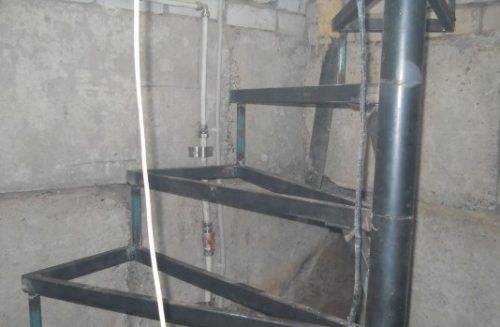
After completing the installation of the frame, we check the angles between the steps and weld the sleeves together. After priming and painting the frame, we put the steps on the resulting frame.
Advice! In such a frame model, it is recommended not to resort to a riser. This will help you place your foot more comfortably on the narrower part of the step.
On this, the production of a metal spiral staircase can be considered ready!
Summary
In this article, we tried to tell you the maximum that could be stated about metal stairs, in principle, and to prove that stairs and metal are interconnected.
We also told you about the types of metal stringers, which will certainly be useful to know. In the video presented in this article, you will find additional information on this topic. Most importantly, remember: do not neglect protection.

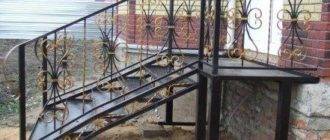
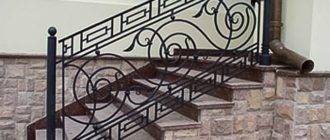
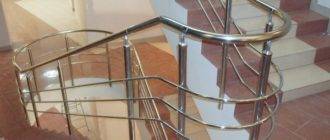
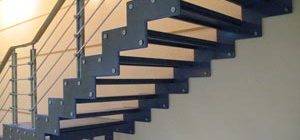
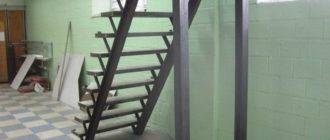
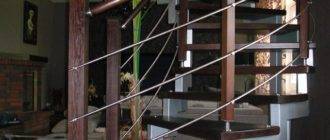
in the first photo there is a staircase that I wanted for myself, but I had to make another one from metal and a profile pipe. outwardly, she is not creative for being reliable.
For the production of stairs of this kind, a good forging studio with talented craftsmen is required, nowadays such are rare
Wooden stairs are, of course, good, but metal structures are still more reliable. In his country house, he installed himself a wrought-iron staircase, and he made it himself, with the exception of elements of artistic forging. The spiral staircase, in terms of characteristics and appearance, was more suited to my requests than the march staircase. In fact, nothing complicated if you follow the instructions correctly.
In the second picture, the ladder is just awful, and I'm even thinking of doing one for myself. In general terms, of course, I imagine how to make it, but could you describe in some detail how to mount it, from which treads, etc.
I liked the stairs as in the second photo. look gorgeous and very creative. I wanted one for myself. I would like to walk through them personally to make sure that the family members are not afraid to walk on them to the second floor.